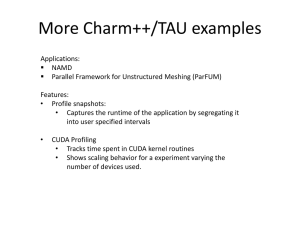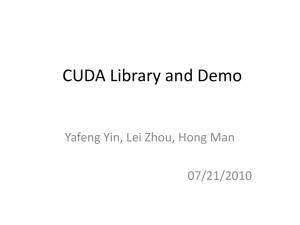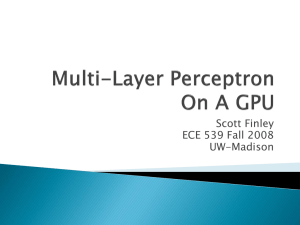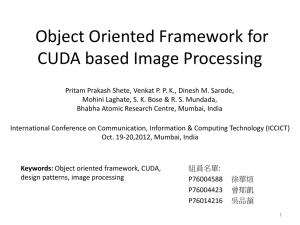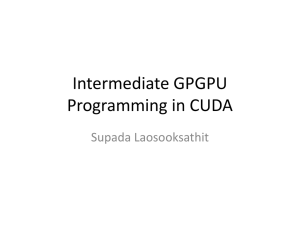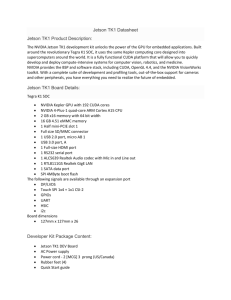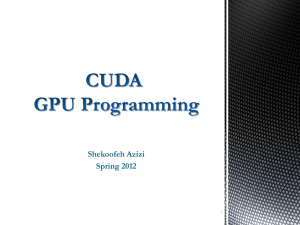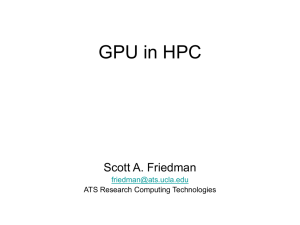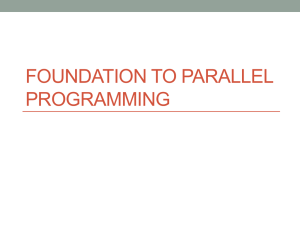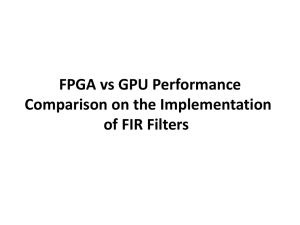09-Parallelization_and_CUDA_libraries
advertisement
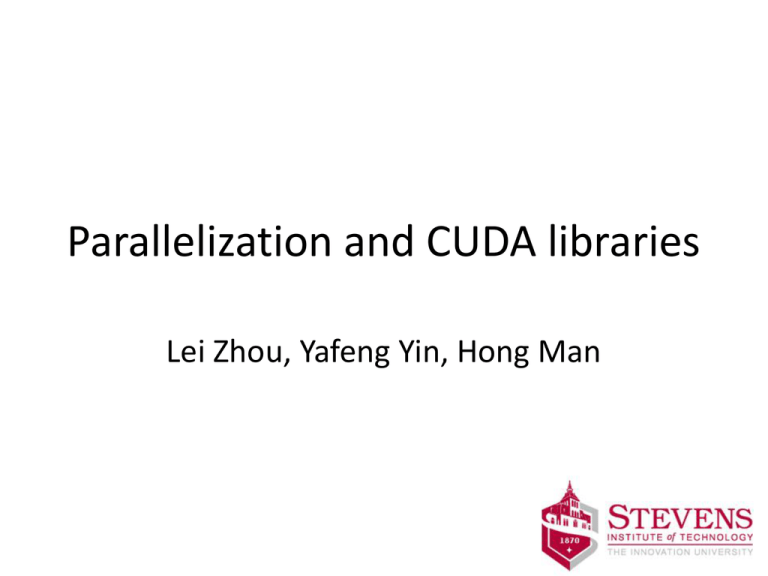
Parallelization and CUDA libraries Lei Zhou, Yafeng Yin, Hong Man Outline GPU & CUDA Manually CUDA Coding CUDA Library FIR Realization Auto Parallelizing Tool GPU & CUDA GPUs are massively multithreaded many core chips Hundreds of scalar processors Tens of thousands of concurrent threads CUDA is the acronym for Compute Unified Device Architecture. GeForce 8800 GTX (128 cores) A parallel computing architecture developed by NVIDIA. The computing engine in GPU. CUDA can be accessible to software developers through industry standard programming languages. Tesla C1060 (240 cores) Processing Flow Serial code executes on the host while parallel code executes on the device. Manually CUDA Coding Find parallel kernels Improve data reuse inside kernels to have better compute intensity Access the memory in a GPU-friendly Take advantage of complex memory hierarchy that make the GPU fast Reduce the copy-in and copy-out transfers that pile up on the PCIe Reduce memory usage in the GPU Limit inter-block synchronizations CUDA Libraries Basic CUDA computation library CUBLAS CUFFT GPULib Advanced CUDA computation library CULA MAGMA VSIPL Basic libraries CUBLAS provides a set of functions for basic vector and matrix operations matrix‐vector copy, sort, dot product, Euclidean norm etc CUFFT is the CUDA FFT library cufftPlan1d() ,cufftPlan2d() ,cufftPlan3d() GPULib provides a library of mathematical functions addition, subtraction, multiplication, and division, as well as unary functions, including sin(), cos(), gamma(), and exp(), interpolation, array reshaping, array slicing, and reduction operations Advanced libraries CULA: GPU Accelerated Linear Algebra provide LAPACK (Linear Algebra PACKage) function on CUDA GPUs MAGMA: Matrix Algebra on GPU and Multicore Architectures develop a dense linear algebra library similar to LAPACK but for heterogeneous/hybrid architectures and "Multicore+GPU" systems Advanced lib -VSIPL VSIPL: Vector Image Signal Processing Library Generalized matrix product Fast FIR filtering Correlation Fast Fourier Transform QR decomposition Random number generation Elementwise arithmetic, logical, and comparison operators, linear algebra procedures Example // Allocate device memory for filter kernel Complex* d_filter_kernel; cutilSafeCall(cudaMalloc((void**)&d_filter_kernel, mem_size)); // Copy host memory to device cutilSafeCall(cudaMemcpy(d_filter_kernel, h_padded_filter_kernel, mem_size, cudaMemcpyHostToDevice)); // CUFFT plan cufftHandle plan; cufftSafeCall(cufftPlan1d(&plan, new_size, CUFFT_C2C, 1)); // Transform signal and kernel cufftSafeCall(cufftExecC2C(plan, (cufftComplex *)d_signal, (cufftComplex *)d_signal, CUFFT_FORWARD)); FIR Realization on CUDA FIR Realization on CUDA Threads t CUDA Demo (FIR) GPU: NVIDIA GeForce 8600 GT CPU: Intel Duo CPU 2.33G Software: Visual Studio 2005 CUDA Demo (FIR) FIR Performance 5000 4500 CPU 4000 CPU+GPU 3500 3000 msec 2500 2000 1500 1000 500 0 1000 10000 100000 1000000 10000000 Auto-Parallelizing Tool Par4All (open source environment): C and Fortran to CUDA C PGI Accelerator: Fortran and C to CUDA C Auto-parallelizing Compiler CAPS HMPP: C and Fortran to CUDA C Autoparallelizing Compiler Goose: C to CUDA C Auto-parallelizing Compiler NOAA F2C : Fortran to CUDA C Translator Par4All (open source environment): C and Fortran to CUDA C
